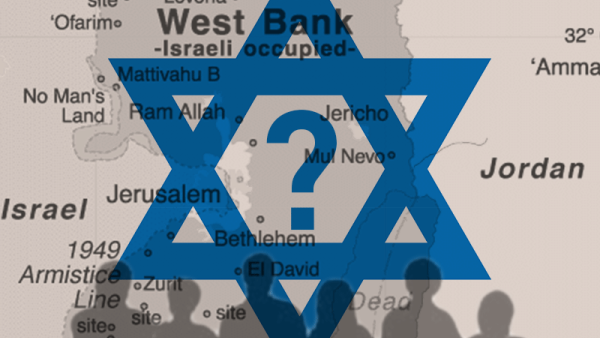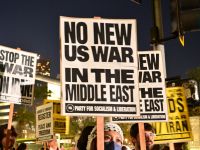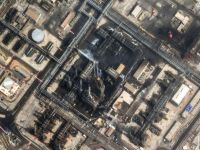- It is assumed zionism is synonymous with anti-Palestinian sentiments
- But many liberal zionists claim they are just as pro-Palestinian as they are pro-Israeli
- They seek a two-state solution that respects the rights of both groups
- Their existene brings nuance to the conversation around the Israeli-Palestinian conflict
By Ty Joplin
When U.S. President Donald Trump recognized Jerusalem as the capital of Israel, it was assumed that the move would be denounced by everybody but staunch zionists. But one group of zionists felt the recognition to be a crushing defeat for their cause.
Those who were outraged are liberal zionists, They are placed in the fragile position of believing in a Jewish homeland while also maintaining the genuine belief that human rights should be upheld at all costs. As such, liberal zionists support the two-state solution, which appears less and less feasible by the week as Trump and Israel’s government push to bury it.
In an ever-polarizing time when the Israeli-Palestinian conflict is becoming more protracted, and each camp is retreating into itself to prepare for a protracted conflict, liberal zionists are seeking to keep the hope of an ethical Israel alive—one that serves as a place that respects the rights of both Israeli Jews and Palestinians.
Currently, there is a widespread understanding that zionism is a monolithic, nationalist ideology that is universally opposed to the establishment of a Palestinian state and denies the rights claims of Palestinians. Israeli settlers illegally building on land in the West Bank justify their actions in the name of settling Zion and kicking out those who could threaten its lands. And for this reason, much of the Israeli-Palestinian conflict has boiled down to Zionists versus Palestinians, but liberal zionists live as a complication of that narrative, and seek to build up Palestinans’ rights at the same time they build a homeland for Jews.
Zion as an Ideal
Protesters demand the end to the Israeli occupation of the Palestinian territories (AFP/FILE)
Zionism is inextricably linked to Jewish settlements and the larger occupation in the West Bank, the systemic denial of rights to Palestinians and state-sponsored violence inflicted upon residents of Gaza by the Israeli military. But as believers in a Jewish state, liberal zionists care deeply about what exactly that state stands for, and how it treats people.
“As a liberal Zionist, I fiercely defend Israel’s right to exist, its right to security, and its legitimacy as a member of the community of nations,” writes Lara Friedman, President of the Foundation for Middle East Peace. “I also fiercely care about what kind of state Israel exists as and the values it embodies. I want to see Israel flourish as a liberal democracy that fully implements the rule of law, adheres to international norms, and respects the civil and human rights of all peoples living under its authority.”
Ori Nir, Director of Communications and Public Engagement for Americans for Peace Now (APN), described was Zionism meant to him in an interview with Al Bawaba: “to me, supporting Zionism means supporting Israel as a national home of the Jewish people, a state that is a true democracy and that maintains a Jewish character. I believe that Israel can fulfill this ideal only if it rids itself of the occupation and helps the creation of a Palestinian state in the West Bank and Gaza, a Palestinian state with which Israel will live in peace and security.”
In the creation of two states, Nir thinks compromise is a necessary part of realizing a homeland for Jews: “the fulfillment or realization of Zionism necessitates compromise over the historic land of Israel.”
The Struggle for Building Positive Peace
A woman holds a sign in support of the BDS Movement (AFP/FILE)
One of the most controversial issues dividing pro-Israeli and pro-Palestinian supporters is the Boycott, Divest and Sanctions Movement, or BDS Movement. Designed as a peaceful way to pressure Israel. The movement’s boycotts “ involve withdrawing support for Israel and Israeli and international companies that are involved in the violation of Palestinian human rights, as well as complicit Israeli sporting, cultural and academic institutions,” according to one of the main websites for the movement.
To this movement, liberal zionists have voiced sympathy although many are not participating in the movement themselves. Friedman defended the movement against bills proposed throughout the United States that would criminalize supporters of BDS. “I think boycotts are political free speech protected by the Constitution of the United States, as affirmed by the Supreme Court, most notably in NAACP v. Claiborne Hardware Co,” Friedman told Al Bawaba.
She does not “personally advocate boycotts, divestment, and sanctions (BDS) against Israel itself,” but she does “defend the right of others to do so.”
Friedman’s criticism of the BDS is that it is all-too broad, pressuring Israeli companies and companies involved with Israel rather than focusing on those corporations involved in the settlement and occupation of the West Bank. For Friedman and others, it is those corporations that are to blame, not the ones involved with Israel in general.
It is important to note here that it is difficult to disentangle these companies from each other and differentiate between them, since doing business in Israel necessarily means tax dollars will be fuel the settlement and occupation machine. But in trying to make this distinction, liberal zionists like Friedman are seeking to re-define the meaning of ‘pro-Israel,’ which is associated with being ‘pro-occupation.’
One of the most prominent liberal zionist advocacy groups has been J Street—a lobby organization pushing for peaceful solutions between Israelis and Palestinians and criticizes Israel’s occupation and over-reliance on violence. J Street’s main rival group on the other hand, The American Israel Public Affairs Committee (AIPAC), represents the type of zionism that actively supports the occupation and settlements.
Both groups claim they are pro-Israel, though the meaning of that phrase has become more politically divisive than ever. Friedman has decried the slow devolution of the phrase ‘pro-Israel’ as to one that “demands the sacrifice of respect for universal values, the rejection of global standards of human rights, and the delegitimization of international law.”
Liberal Zionism and its Critics
A Palestinian refugee camp erected in Syria to house those expelled from Palestine during the Nakba (Wikimedia Commons)
However, liberal zionism, in its attempts to redefine being ‘pro-Israel’ as one that is compatible with human rights, has been approached as an incoherent ideology—one that tries to maintain the right of Israel’s existence while responding to the historic injustices suffered by Palestinians in the name of creating such a homeland for Jews.
The most striking example is the expulsion of hundreds of thousands of Palestinians in 1948. Palestinians call this event the Nakba, or catastrophe, while many Israelis celebrate the founding of Israel as a landmark moment in Jewish history. Even some liberal zionists, who have been fiercely critical of the occupation of the West Bank, seem ambivalent about the Nakba.
This sentiment is reflected in a New Yorker piece exploring the complicated position of being pro-Israeli and pro-human rights: “Had Jewish liberals been true to themselves, they might never have justified the founding of a state that displaced Arabs… But if Israeli liberals are embattled, they are not walking contradictions in terms. They need international backing.”
- What is the Pro-Israel Lobby and How is it Shaping US Foreign Policy on Iran?
- How the Jerusalem Decision is Pushing Jordan Towards Erdogan
In approaching the question of the Nakba, Ori Nir was at first trepidatious: “as far as I'm concerned, I'm looking toward the future hoping for a practical resolution rather than to the past, realizing that the conflicting narratives of the past are irreconcilable.”
However, when pressed, Nir laid out a platform that both responds to the historical atrocities carried out by Israel during its founding and creates representative states, one that includes: “Palestinian refugees' return to the future Palestinian state, reparations, [the] choice of settling in a [W]estern country, Israel absorbing a limited number of refugees, Israel acknowledging the suffering of Palestinians as a result of the 1948 war,” and finally, “no mass absorption of Palestinian refugees within the sovereign borders of the state of Israel after a peace agreement is reached,” and a “Palestinian ‘end of claims’ commitment.”
Though some have speculated that liberal zionists will be forced to choose between support for Israel and commitment to human rights, many have been steadfast in their drive to have both. If they give up respect for human rights, they would also relinquish a key part of their identity and the moral foundation to legitimize the state of Israel.
They would also acquiescence to the simplistic narrative that there’s only one shade of zionism—one that cannot succeed as long as Palestinians do. They have, and will continue to insist that the ideas of human rights and Israel can be compatible.







